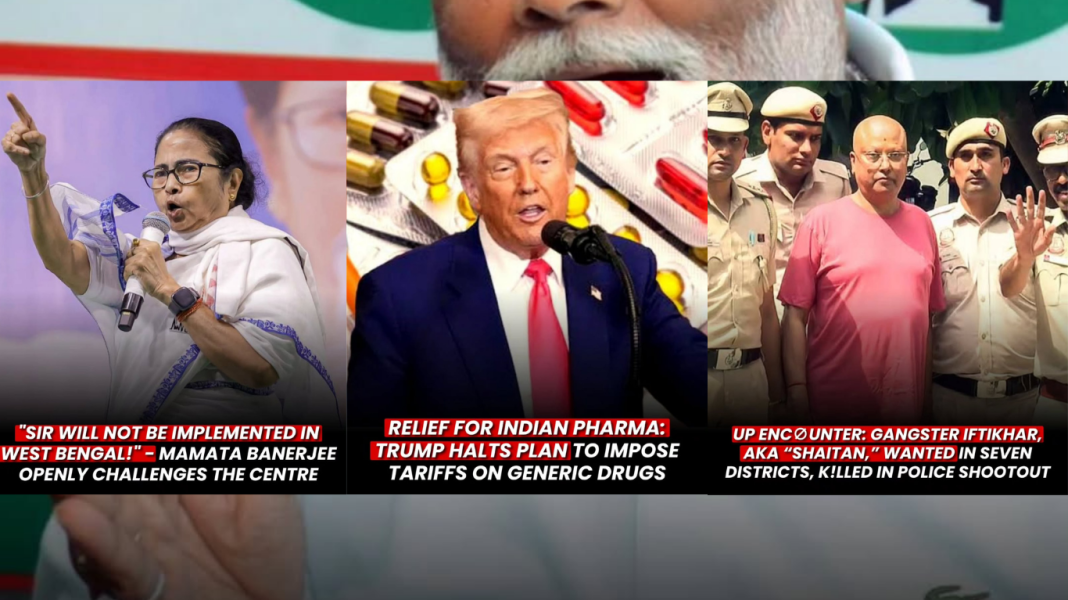1. West Bengal Says No to SIR Implementation
In a bold political move, West Bengal has refused to implement the School Information Reform (SIR) initiative. The state government stated that education policies must align with regional priorities, not one-size-fits-all central guidelines. While some argue this decision will maintain Bengal’s autonomy in education, critics fear it could limit access to digital reforms that other states are adopting.
Teachers’ unions welcomed the move, saying “We don’t need another layer of bureaucracy.” On the other hand, policy experts believe Bengal might lose out on data transparency tools that help track student progress. Either way, this decision signals a strong stance by the state on maintaining independence in policymaking.
2. Ayodhya Explosion Raises Security Concerns
The sacred city of Ayodhya was rocked by an explosion that sent shockwaves across India. Initial reports confirmed multiple injuries, though officials acted swiftly to control the situation. Investigations by the police, ATS, and NIA are underway, with early findings suggesting a possible gas leak rather than a planned attack—though nothing has been ruled out yet.
Given Ayodhya’s religious and political sensitivity, the incident prompted nationwide concern. Leaders from all sides urged citizens to remain calm while demanding a thorough probe. On social media, hashtags like #PrayForAyodhya and #AyodhyaExplosion trended, reflecting both fear and unity among citizens. For now, authorities have tightened security across the region to prevent panic and ensure peace.
3. Relief for Indian Pharma as Trump Halts Import Plan
In international news with major implications for India, former U.S. President Donald Trump has paused his plan to restrict pharmaceutical imports, a move that has brought visible relief to India’s $50-billion pharma industry. The policy, aimed at reshoring drug production, could have hit Indian exporters hard.
The halt comes as a welcome breather—India supplies around 40% of generic drugs to the U.S. market. Pharmaceutical giants like Sun Pharma and Dr. Reddy’s Labs saw a small market rally following the announcement. Economists view this as a sign of improving U.S.-India trade stability. As one analyst quipped, “When politics takes a painkiller, the market feels better.” The pause also opens doors for continued global collaboration in healthcare innovation and affordable medicine supply chains.
4. UP Encounter: The End of Gangster Iftikhar aka ‘Iffi’
In Uttar Pradesh, notorious gangster Iftikhar alias ‘Iffi’ was killed in a police encounter, marking another chapter in the state’s ongoing crackdown on organized crime. Police officials reported that Iftikhar opened fire when cornered, leading to retaliatory action.
Known for extortion and murder cases across western UP, Iffi had been on the run for months. While many citizens lauded the encounter as justice served, human rights groups raised concerns about the growing “encounter culture” in the state.
Since 2017, UP has recorded over 180 alleged encounters, sparking a debate about law, order, and due process. Yet, many residents feel safer, saying such operations have restored a sense of fear among criminals. The episode once again puts UP’s “zero tolerance for crime” policy in the national spotlight.
5. Bihar Election 2025: Alliances, Issues, and Expectations
As Bihar gears up for its 2025 elections, the political battleground is heating up. Chief Minister Nitish Kumar faces renewed challenges from Tejashwi Yadav, while the BJP eyes a strong comeback. The election promises to be a clash of ideology, legacy, and new-generation leadership.
Ground issues remain the same—unemployment, migration, and development. “Bijli-paani aur naukri,” say voters, summarizing Bihar’s priorities in three words. Meanwhile, social media is buzzing with campaign memes and digital rallies, as leaders adapt to the online era of politics.
Early surveys suggest a tight contest with no clear frontrunner yet. For now, the political mood seems more curious than committed—Bihar’s voters are watching every move closely. Whatever the outcome, this election could shape the tone for national politics in 2026.
Conclusion: A Week of Contrasts and Consequences
From education reforms and law enforcement to international diplomacy and state elections, this week’s headlines highlight India’s dynamic democracy. West Bengal’s defiance shows regional confidence; Ayodhya’s tragedy tests resilience; Trump’s pharma pause proves the power of global interdependence; UP’s encounter raises justice questions; and Bihar’s election reminds us that democracy, though noisy, never sleeps.
In short—India never has a dull moment, and every headline carries a story that shapes the nation’s pulse.
